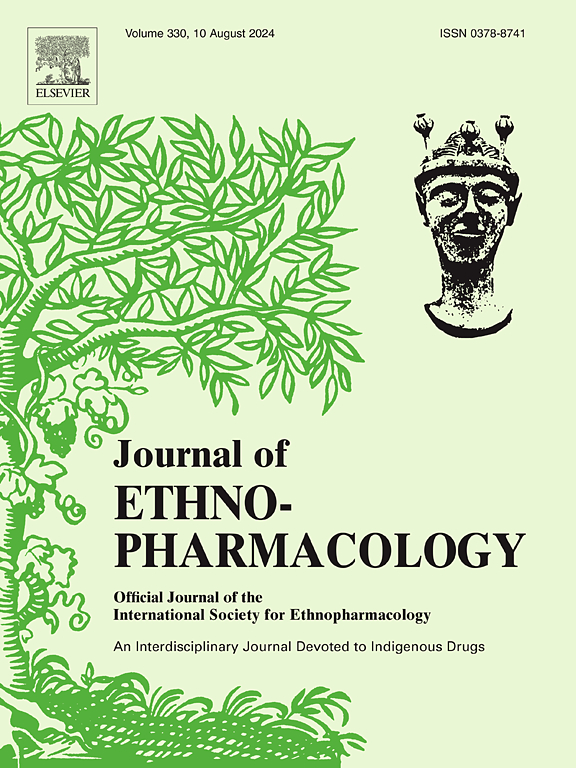Broad range lipidomics and metabolomics coupled with 16S rRNA sequencing to reveal the mechanisms of Huangkui Capsule against cisplatin-induced nephrotoxicity
IF 4.8
2区 医学
Q1 CHEMISTRY, MEDICINAL
引用次数: 0
Abstract
Ethnopharmacological relevance
Huangkui Capsule (HKC) is a traditional Chinese medicinal preparation. Numerous clinical studies have reported that HKC has a good nephroprotection effect. The clinical application of cisplatin is greatly limited by its nephrotoxicity, and HKC shows promise in preventing cisplatin-induced nephrotoxicity (CIN).
Aim of the study
To evaluate the effectiveness of HKC in alleviating CIN and explore its underlying action mechanisms.
Materials and methods
A rat model of CIN was established via single-dose injection of cisplatin. The effectiveness of HKC was evaluated by biochemical indices and pathological sections. Then, serum, kidney, and cecal endogenous metabolic profiles as well as the gut microbiota were characterized using lipidomics, metabolomics, and 16S rRNA high-throughput sequencing technique. Spearman's correlation analysis was carried out between gut microbiota, biomarkers, and biochemical indices. Finally, antibiotic treatment was performed to establish a pseudo-sterile rat model and validate the nephroprotection of HKC in a gut microbiota-dependent manner.
Results
HKC could significantly attenuate the abnormal elevation of serum creatinine and urea nitrogen, kidney index, and kidney injury score in CIN rats, remarkably alleviate the disturbance of metabolic profiles of serum, kidney, and cecal contents, corresponding to the endogenous metabolites such as fatty acids, phosphatidylcholines, amino acids, acylcarnitines, and short-chain fatty acids, and enrich the diversity of gut microbiota. Spearman's correlation analysis revealed that Clostridium_sensu_stricto_1 was positively correlated with the altered short-chain fatty acids in serum and negatively correlated with the altered acylcarnitine in the kidney. In the pseudo-sterile rat model, the attenuation effect of HKC on the abnormal elevation of serum creatinine and urea nitrogen, along with the alleviation of metabolic profile disorders, was greatly diminished or even abolished, demonstrating the nephroprotective effect of HKC in a gut microbiota-dependent manner.
Conclusions
HKC exerted the nephroprotective effect on CIN in a gut microbiota-dependent manner, mainly by regulating Clostridium_sensu_stricto_1 mediated metabolisms of phosphatidylcholines, acylcarnitines, fatty acids, tryptophan, and short-chain fatty acids, thereby reducing the inflammatory response. The present study could provide reliable scientific evidence for gut microbiota-dependent mechanisms of HKC in the treatment of kidney injury and may widen the clinical application of HKC in cisplatin-containing cancer therapy.

大范围脂质组学和代谢组学结合16S rRNA测序揭示黄葵胶囊抗顺铂肾毒性的机制。
民族药理学相关性:黄葵胶囊是一种中药制剂。大量的临床研究报道了香港岛具有良好的肾保护作用。顺铂的肾毒性极大地限制了其临床应用,而HKC在预防顺铂所致肾毒性(CIN)方面显示出良好的前景。本研究的目的:评价HKC缓解CIN的有效性,并探讨其潜在的作用机制。材料与方法:单剂量注射顺铂建立大鼠CIN模型。通过生化指标和病理切片评价HKC的疗效。然后,使用脂质组学、代谢组学和16S rRNA高通量测序技术对血清、肾脏和盲肠内源性代谢谱以及肠道微生物群进行了表征。对肠道菌群、生物标志物和生化指标进行Spearman相关分析。最后,通过抗生素治疗建立伪无菌大鼠模型,验证HKC在肠道菌群依赖下的肾保护作用。结果:HKC能显著减轻CIN大鼠血清肌酐、尿素氮、肾脏指数、肾损伤评分异常升高,显著缓解血清、肾脏、盲肠内容物代谢谱紊乱,相应的内源性代谢物如脂肪酸、磷脂酰胆碱、氨基酸、酰基肉碱、短链脂肪酸等,丰富肠道菌群多样性。Spearman相关分析显示,Clostridium_sensu_stricto_1与血清短链脂肪酸改变呈正相关,与肾脏酰基肉碱改变负相关。在伪不育大鼠模型中,HKC对血清肌酐和尿素氮异常升高的抑制作用随着代谢谱紊乱的缓解而大大减弱甚至消失,表明HKC的肾保护作用以肠道菌群依赖的方式存在。结论:HKC主要通过调节Clostridium_sensu_stricto_1介导的磷脂酰胆碱、酰基肉碱、脂肪酸、色氨酸和短链脂肪酸的代谢,从而减轻炎症反应,以肠道菌群依赖的方式对CIN发挥肾保护作用。本研究可为HKC治疗肾损伤的肠道菌群依赖机制提供可靠的科学依据,并可能扩大HKC在含顺铂癌症治疗中的临床应用。
本文章由计算机程序翻译,如有差异,请以英文原文为准。
求助全文
约1分钟内获得全文
求助全文
来源期刊

Journal of ethnopharmacology
医学-全科医学与补充医学
CiteScore
10.30
自引率
5.60%
发文量
967
审稿时长
77 days
期刊介绍:
The Journal of Ethnopharmacology is dedicated to the exchange of information and understandings about people''s use of plants, fungi, animals, microorganisms and minerals and their biological and pharmacological effects based on the principles established through international conventions. Early people confronted with illness and disease, discovered a wealth of useful therapeutic agents in the plant and animal kingdoms. The empirical knowledge of these medicinal substances and their toxic potential was passed on by oral tradition and sometimes recorded in herbals and other texts on materia medica. Many valuable drugs of today (e.g., atropine, ephedrine, tubocurarine, digoxin, reserpine) came into use through the study of indigenous remedies. Chemists continue to use plant-derived drugs (e.g., morphine, taxol, physostigmine, quinidine, emetine) as prototypes in their attempts to develop more effective and less toxic medicinals.
 求助内容:
求助内容: 应助结果提醒方式:
应助结果提醒方式:


